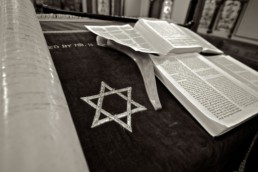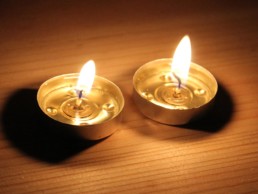Learning Forgiveness in the Age of Cancel Culture
As the seventh Psalm wraps up, representing the seventh day of the week, the congregation at Stephen Wise Free Synagogue on 30 West 68th Street sits down. Rabbi Ammiel Hirsch approaches the front of the Bimah, where the Torah is read, to begin his weekly Friday night sermon.
Instead of focusing on a piece of scripture, Hirsch begins with a story from pop culture.
“I never met Whoopi Goldberg,” he began. “And I don’t watch The View.”
A couple members of the congregation reacted with nervous laughter at the mention of Goldberg in light of recent events. Hirsch waited a couple beats before continuing his speech. Earlier in the week, Whoopi Goldberg was suspended for two weeks from her daily talk show, The View, for saying that the Holocaust was “not about race” on air.
“Whoopi Goldberg said some truly offensive and ignorant things, but she apologized immediately and sincerely,” Hirsch said. “Repentance, forgiveness and atonement are central concepts in religion.”
As Hirsch spoke, his congregation nodded their heads slowly in agreement. They too believed that forgiveness is a crucial part of their worship and faith.
“Americans nowadays seem incapable of accepting apologies,” Hirsch continued.
For both the teacher and his students, the message was about how to face “cancel culture,” or the fear of societal backlash over a genuine mistake, as an observant Jew. Hirsch’s sermon used Goldberg’s offensive comment as an opportunity to talk about forgiveness and trust in God. Both of these tenets are core to Judaism, according to Hirsch.
Hirsch explained to his congregation that human nature resists wanting to own mistakes and apologize for them, emphasizing that “it is hard to do.”
Many quizzical looks filled the faces of Hirsch’s listeners then. If forgiveness was essential to their faith, but it was difficult to do, what were they supposed to do? Was there a way they could combat this human urge with their religion?
Hirsch had an answer: The High Holy Days.
According to Hirsch, the High Holy Days, also known as Rosh Hashanah and Yom Kippur, are meant for repentance and forgiveness. In Hebrew, Rosh Hashanah means, “Beginning of the Year,” and Yom Kippur means “Day of Atonement.” Hirsch’s sermon focused on both the literal and spiritual meanings of each by explaining how to react and forgive Goldberg for her comment. Hirsch said he believes she should be forgiven because she genuinely apologized and atoned for what she said.
“Judaism is so insistent on contrition and forgiveness that our holiest season of the year, our highest of High Holy Days, is devoted to urging people to repent and forgive,” Hirsch said. “The reason we make such a big deal about it — ten full days of almost nonstop prayer and lamentation, beating our chests in sorrow — is that it is hard to do.”
Hirsch was teaching his worshippers to forgive Goldberg not because it is the easy thing to do, but because from his view, forgiveness is the right thing to do. The reason why forgiveness and acceptance are so important to human relationships is because without them, society will end up “nasty, brutish, violent and tribal,” Hirsch said.
Instead of using a reading or lesson from the Torah, which is the law of God as revealed to Moses and recorded in Hebrew, Hirsch used a news story to teach the Jewish values of forgiveness and atonement.
Cantor Daniel Singer explained that the Friday sermon is different from the Saturday sermon each week during Shabbat services. Singer said that the Rabbi, Hirsch, has never given the same sermon twice. At Stephen Wise Free Synagogue, the Torah is only read on Saturday and holidays, according to Singer.
Most Saturdays, the sermon or speech is given by a Bat or Bar Mitzvah, instead of Hirsch, after their Torah reading, Singer said. According to Singer, Hirsch draws from all areas of life for his weekly sermons, but enjoys preaching about Jewish heritage, history and social justice issues the most.
Meeting the Shabbat Bride
As the sun set on Friday evening, the congregation at Stephen Wise Free Synagogue sat at least six feet apart from each other, indicating a sign of the pandemic that’s engulfed the world for the past two years. The service began with six songs led by Cantor Daniel Singer, from the Kabbalat Shabbat, one to symbolize each day of the preceding week leading up to this service.
As the songs continued, everyone in attendance remained standing, facing the front of the Synagogue, where the Torah rests and the Cantor stands. Some participants clap to the beat of the song. Others gently rock back and forth. Some do a combination of both. Each song flows from one into another, with no break. The melodies merge from one to the next, with Cantor Singer saying which page to turn to in between the first verse of the songs.
On the seventh song, the service changes unexpectedly and without warning.
With no prompting from the cantor, everyone silently turns towards the back of the synagogue before they start singing, with no prompting from the Cantor. They all know what to do. Next steps and movements are all ingrained, as they slowly turn around while singing. The flow of the service up until this point could be analogized with the beginning of a traditional Western wedding. There is a prelude of songs, where everyone faces the front, and then when it is time for the bride to make her grand entrance, the crowd faces her. Each person smiles as they sing the seventh song, welcoming the long-awaited day of rest as if it were a young woman walking down the aisle.
Instead of focusing on the memorial plaques on the rear wall, all eyes are on the main door of the synagogue. For the remainder of the song, the door is the main focus. The clapping and rhythmic movement ceases, as they usher in the true beginning of Shabbat.
A small red light turns on next to some names on the memorial back wall. The lights symbolize an anniversary of death. But, death is not the focus in this ritual. Instead, the focus is the ultimate symbol of love and life, marriage.
In this case, the bride is the Shabbos everyone is welcoming. The lyrics of the song translate in English to, “Beloved, come to meet the bride; beloved come to great Shabbat.”
Singer explained that this tradition comes from the Jewish Mystical tradition, the Kabbalah. Welcoming Shabbat as a bride, he said, “is a metaphor for the time of redemption.” The Hebrew, “Boi Kallah,” means “come my beloved.” One day, the goal is to reach a day when the Messiah will come, and everyone will be peace.
“We pray for a day when we’ll be able to have Shabbat rest all the time,” Singer said.


